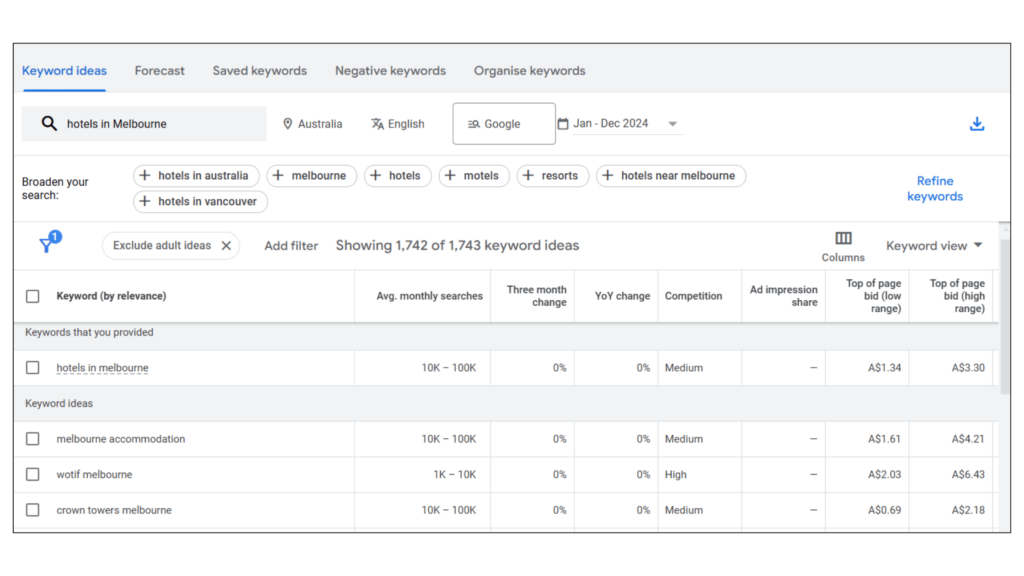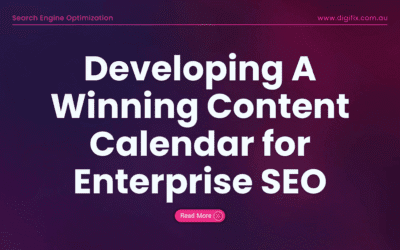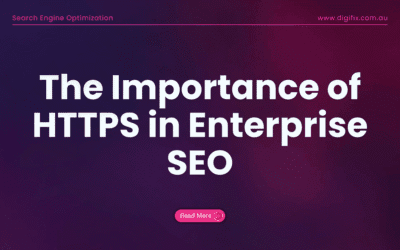Welcome to the Ultimate Guide to SEO for Hotels in 2024! In this comprehensive guide, you’ll discover everything you need about Hotel SEO, from the fundamentals to advanced strategies and tips designed to elevate your hotel’s online visibility and attract more bookings. Dive in and get ready to optimize your digital presence like never before!
Understanding the Basics of Hotel SEO
If you are a business owner with an official Business website, I am 100% sure you have heard about SEO (Search Engine Optimization.) SEO is the process of optimizing a website to improve its search engine rankings on search engine results pages (SERPs).
For example, imagine someone looking for the best hotels in Melbourne. If you have a good hotel SEO strategy, your hotel’s website ranks higher on search engine result pages.
Securing a place among these higher ranks guarantees that potential guests will discover you and visit your website for more information.
So, how is “Hotel SEO” different from regular SEO? Well, hotel SEO is a specialised version of SEO for hotels and other hospitality businesses. The main purpose of Hotel SEO efforts is to increase the traffic to your website. For a hotel, this can translate into more direct bookings, higher revenue, and reduced reliance on third-party booking sites.
Building a successful Hotel SEO strategy takes time, patience, and a comprehensive approach. With more people searching online for hotels, having a strong SEO strategy helps to capture the attention of potential guests before they ever consider your competitors.
Hotel SEO is more than just an online marketing strategy, it’s the pathway to becoming a leading option for travellers in your area.
In this blog post, we will provide a comprehensive guide for Hotel SEO marketing to grow your hospitality business.
Why is SEO for Hotels Important?
SEO for hotels is paramount because it positions your business website in front of travellers at the precise moment they are looking for accommodation. According to Google, travellers use search engines more than any other online marketing channel to start their travel planning.
This means that when potential guests search for a hotel, your hotel needs to be visible on search engines like Google.
Let’s see some key reasons why SEO matters for Hotels,
High usage of search engines by travellers:
Studies show that over 60% of travellers begin their journey by using a search engine. This highlights the importance of SEO as a primary method of reaching prospective guests. If your hotel is not appearing in search results during this early stage, you are missing out on a massive portion of potential bookings.
First-page rankings drive more clicks:
Websites that appear on the first page of search results receive over 90% of the traffic. This means that a higher ranking not only increases your visibility but also significantly boosts the likelihood of travellers clicking on your hotel’s website.
SEO generates high-quality traffic:
Unlike paid advertising, which can attract a broad audience, SEO targets users actively searching for hotels or travel-related information. These are high-intent users who are more likely to convert into bookings. For example, someone searching for “best hotels in Sydney” or “accommodation near Queen Victoria Market” is already in the mindset to book a stay, making them a valuable lead.
Cost-effective marketing strategy:
While paid advertising campaigns like Google Ads or social media promotions can get expensive, SEO is a cost-effective strategy that delivers long-term results. Once your hotel ranks high on search engines, you can consistently attract organic traffic without ongoing ad spend, leading to commission-free bookings.
SEO Tips for Hotels: Boosting Your Online Visibility
When learning SEO for hotels, it’s a must to understand the right strategies that can help increase your online visibility and attract more bookings. Implementing these SEO tips for hotels can set you on the right path to conquer search engine results and capture more direct bookings.
1. Conduct a Comprehensive Keyword Research
Focusing on relevant keywords and developing a solid keyword strategy is the foundation of effective SEO for hotels.
Keywords are the words and phrases people use in search engines to find information. For example, when someone searches for a hotel in New York, he might use keywords such as,
- Hotels in New York
- Hotels around New York
- Affordable accommodations in New York
When you create a good keyword strategy for your hotel, it’s essential to understand the four types of user intent (intentions) and how they relate to your hotel:
Informational Intent: Users are looking for information. For example: “Best time to visit Melbourne” or “Things to do in Brisbane.” You can use these keywords to create content such as travel guides or blog posts.
Commercial Intent: Users are considering their options but haven’t decided yet. For example: “Top hotels in Sydney” or “Family-friendly hotels near Melbourne.”
Transactional Intent: Users are ready to book or take an action. For example: “Book a hotel room in Crown Tower Hotel” or “Hotel with pool in Sydney.”
Navigational Intent: Users are looking for a specific brand or hotel. For example: “ABC Hotel official website” or “ABC Hotel contact details.”
When you develop a keyword strategy, consider your hotel’s main features and characteristics. Think about what makes your hotel unique and what guests would be searching for, such as:
- Descriptive terms travellers use to describe your hotel (e.g., “luxury hotel in Melbourne CBD,” “boutique hotel near Queen Victoria Market,” “pet-friendly hotel in Brisbane”).
- The reasons people are visiting your location (e.g., business travel, vacations, weddings, or conferences).
- Activities or attractions they might be interested in (e.g., “hotels near [popular attraction],” “hotels close to [event venue]”).
- Unique features or services your hotel offers (e.g., “wedding venues in [location],” “conference rooms in [city],” “spa hotels in [location]”).
As you identify potential keywords, validate them using keyword research tools. One of the best tools for this is the Google Ads Keyword Planner, which provides insights into the average monthly search volume for each keyword, keyword competition, and relevant keywords. This information helps you understand which keywords are worth targeting and how competitive they are.
Example of keyword Research using Google Ads Keyword Planner:
1. Enter general terms related to your hotel, such as “hotels in Melbourne.”
2. Google Ads Keyword Planner will generate a list of related keywords along with search volume data.

3.Identify keywords with high search volume and moderate competition. Add these to your list of primary and secondary keywords.
Then you need to identify Primary Keywords and Secondary Keywords.
A primary keyword or Target keyword is the main topic or term you want a particular page to rank for. These are usually more competitive keywords but are essential to target.
For example, if your hotel is pet-friendly, you’ll want to create content around keywords like “pet-friendly hotel in [location]” or “hotels that allow pets in [city].”
Secondary keywords are more detailed but still connected to your primary keywords. They reflect what users might be searching for before making a decision.
For example, related keywords for “pet-friendly hotel” could be “hotels near dog parks in [city]” or “best hotel for pets in [location].”
These secondary keywords can help you build out supporting content, such as blog posts or FAQs, that address common questions or concerns of potential guests.
Developing a strong keyword strategy for hotel SEO ensures your website is discoverable by potential guests searching for accommodations and related services. Here’s a deeper explanation of the key steps and considerations:
1. Target Terms Travelers Use to Describe Your Hotel
Understanding how travelers perceive or search for your property allows you to align with their expectations.
- Examples:
- “Luxury beachfront hotel in Sydney”
- “Pet-friendly boutique hotel in Melbourne”
Highlight unique selling points (USPs) in your content and metadata, like location, amenities, or style.
2. Why Are People Traveling to Your Location?
Guests often travel for specific reasons—work, leisure, events, or family trips—and they search accordingly.
Examples:
- “Hotels near Sydney Opera House”
- “Accommodation close to Melbourne business district”
Focus on proximity keywords and tailor your content to meet those needs, such as emphasizing nearby landmarks or attractions.
3. What Are They Looking to Do?
People search for hotels as part of their broader plans, such as sightseeing, relaxing, or attending events.
Examples:
- “Hotels near best wineries in Yarra Valley”
- “Sydney hotels with spa and wellness facilities”
Create experience-based content that highlights your hotel as the perfect base for their activities, such as blog posts or destination guides.
4. What Would They Like About Your Property?
Specific amenities and features can be the deciding factor for many travelers.
Examples:
- “Hotels with rooftop pools in Brisbane”
- “Family-friendly hotels in Gold Coast with kids’ club”
Showcase these features prominently on your website, in blog content, and through targeted campaigns.
5. What Peripheral Services Does Your Property Offer?
Many hotels provide additional services like hosting weddings, conferences, or events, which attract niche searches.
Examples:
- “Wedding venues in Melbourne with accommodation”
- “Conference hotels in Sydney with meeting rooms”
Dedicate landing pages or sections of your site to these services, optimizing them with relevant keywords.
6. Validate Keywords with Research Tools
Assumptions about keywords can be misleading. Tools like Google Keyword Planner, SEMrush, or Ahrefs provide data on search volume and competition.
What to Look For:
- Search Volume: How many people search for a term monthly?
- Keyword Difficulty (KD): How hard it is to rank for the term.
- Related Keywords: Variations or long-tail keywords that might be easier to rank for.
Actionable Steps:
- Input your chosen keywords into a research tool.
- Focus on high-volume keywords (to drive traffic) and low-competition keywords (for easier ranking).
- Identify long-tail keywords (e.g., “affordable family hotels near Sydney Harbour”) to target niche audiences.
2. Claim Your Free Google Business Profile
One of the most critical aspects of local SEO is optimising your Google Business Profile (formerly known as Google My Business). This free tool allows your hotel to be prominently featured on Google Maps and as part of rich results displayed on the Google results page.
Setting up and optimising your Google Business Profile will make it easier for local travellers or anyone searching for hotels in your area to find your property. It can also showcase important information such as your hotel’s address, phone number, website link, amenities, and even guest reviews—all of which can influence potential guests’ booking decisions.
Why is a Google Business Profile Important for Your Hotel?
- Improves Local Visibility
By claiming and optimising your Google Business Profile, your hotel can appear in the Local Pack, a set of three business listings displayed prominently on the first page of Google search results for local queries, such as “hotels near me” or “hotels in [location].” Being in this top three is highly valuable as it can drive a significant amount of traffic to your website and increase direct bookings.
- Shows Your Hotel on Google Maps
A well-optimised Google Business Profile ensures your hotel shows up accurately on Google Maps, which is used by travellers to find accommodations nearby. This is particularly useful for guests who are already in your area and looking for a place to stay.
- Enhances Your Hotel’s Online Reputation
Your profile allows guests to leave reviews and share their experiences. Responding to these reviews not only helps build a positive online reputation but also shows prospective guests that you are attentive and value customer feedback.
How to Set Up Your Google Business Profile?
To get started, refer to our blog article on setting up your Google Business Profile. This comprehensive guide will walk you through the step-by-step process of claiming, verifying, and optimising your profile to ensure it stands out and attracts more bookings.
Or you can watch the full tutorial on our YouTube Channel,
By claiming and fully optimising your Google Business Profile, your hotel can gain a competitive advantage in local search results and become more visible to potential guests searching for accommodation options in your area.
3. Build Authority with Link Building
Google considers quality backlinks as endorsements of trustworthy and authoritative content, helping refine the accuracy and relevance of its search results. Elevate your hotel SEO work by obtaining these trusted backlinks to improve your website visibility and ranking.
What is a Backlink?
A backlink is a hyperlink from one website to another website. It is a vote of confidence and authority. When a reputable website links to your site, it signals to Google that your content is credible and worth displaying higher in the search results.
Strategies to Build High-Quality Backlinks:
- Online Directory Listings
Ensure your hotel’s profile is present and accurate on leading online directories such as Google, Yelp, Bing Places, TripAdvisor, and Facebook. These platforms provide valuable backlinks to your website. Relevance is key here; aim for listings on travel or accommodation-specific directories or local tourism hubs.
- Forge Local Partnerships
Collaborate with local businesses such as tour operators, restaurants, or popular attractions. For example, a local restaurant might list your hotel as a recommended accommodation option on their site, providing you with a link that enhances your SEO.
- Guest Blogging
Contribute guest articles or blog posts to local travel or hospitality sites. Writing about topics such as “Top Things to Do in [Location]” or “Best Places to Eat Near [Your Hotel]” positions you as an industry authority. In return, you can gain a backlink to your hotel’s website, driving both SEO value and potential traffic from readers interested in visiting your area.
- Harness the Power of Testimonials
Encourage satisfied guests to write reviews on your site and other review platforms. Genuine feedback builds your hotel’s credibility. Additionally, you can write testimonials for your local partners, such as tour operators or event venues, and ask for a backlink in return.
With these link-building strategies, you can boost your hotel’s online presence, enhance your credibility, and ultimately attract more guests to your property.





0 Comments